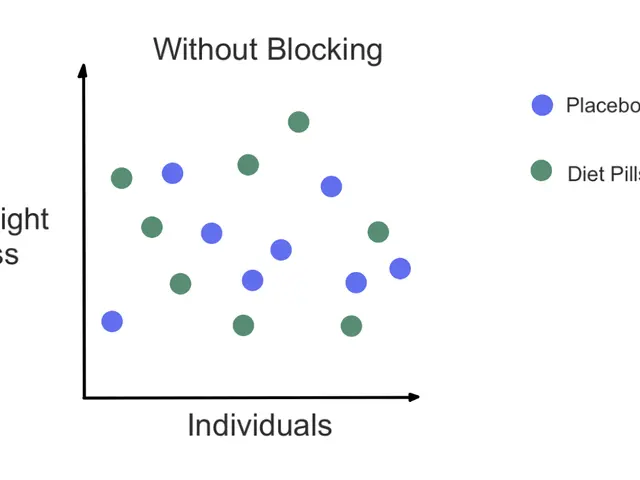Exploring the Relationship Between Obesity and Health Consequences: A Study on Potential Health Risks
In the pursuit of maintaining a healthy lifestyle, understanding the effects of weight on overall wellness becomes crucial. A recent body of research has shed light on the significant impact that obesity and excessive body fat have on cognitive function and brain health across various life stages.
One of the most concerning findings is the obesity paradox, where seemingly normal Body Mass Index (BMI) individuals face health risks due to high body fat levels. This paradox is particularly relevant when it comes to brain function, as poor measurement of body fat may contribute to the underestimation of these risks.
Obesity can negatively affect cognitive function in several ways. For instance, it can lead to reduced functional connectivity in key brain regions, such as between the subcortical-cerebellum and motor/attention networks. This reduction in connectivity is associated with poorer cognitive flexibility and executive function later in life.
Trajectories of increasing total body fat are linked to more pronounced cognitive decline compared to stable or decreasing fat trajectories. Weight changes from midlife onwards are also associated with cognitive health, with weight increases in middle-aged women being particularly detrimental.
Research suggests a bidirectional relationship between adiposity and cognitive function. Higher body mass index (BMI) can predict cognitive performance decline, especially in executive function and processing speed.
The impact of obesity on brain cells and regions is also significant. Obesity affects the structure and function of astrocytes, which are crucial for brain metabolism. Manipulating astrocytes in obesity models has shown potential in restoring cognitive function, highlighting their role in brain health.
The relationship between obesity and cognitive function is also influenced by neuroinflammation. Studies have shown that obesity can lead to neuroinflammatory changes, which may contribute to cognitive impairments.
Inflammation triggered by excess weight can detrimentally affect cognitive function. High body fat percentage, even in individuals with a normal BMI, has been linked to accelerated aging effects. Maintaining a healthy weight is essential for preserving cognitive function and brain health.
Excess weight can accelerate the aging process and contribute to cognitive decline in older individuals. Obesity is linked to an increased risk of developing Alzheimer's Disease and Vascular dementia. Obesity-related damage to brain blood vessels can lead to cognitive decline.
High-fat diets associated with plumpness can result in cognitive impairment. However, reducing abdominal fat through targeted exercises and dietary adjustments can lower the potential health risks associated with plumpness.
In conclusion, obesity and excessive body fat can negatively affect cognitive function by altering brain connectivity, contributing to cognitive decline, and influencing cellular function, such as astrocyte activity. These effects can vary across different life stages, emphasizing the importance of maintaining healthy body weight trajectories for optimal brain health.
- Science has revealed that obesity and chronic diseases, such as cancer, have a significant impact on health-and-wellness, including mental-health and cardiovascular-health.
- Maintaining a healthy lifestyle, through fitness-and-exercise and proper nutrition for weight-management, becomes crucial in managing medical-conditions and preventing cognitive decline.
- The effects of obesity on cognitive function can be seen in reduced functional connectivity between key brain regions, leading to impaired cognitive flexibility and executive function.
- The financial implications of these health issues are evident, as they may require therapies-and-treatments, potentially draining personal-finance and even Medicare resources.
- Wealth-management, then, becomes an essential aspect of overall wellness, ensuring one can afford necessary healthcare and maintain a lifestyle that promotes good health.
- The obesity paradox, where seemingly normal BMI individuals face health risks due to high body fat levels, underscores the importance of accurate body-fat assessment for comprehensive health evaluations.
- In the long run, addressing obesity and its effects on cognitive function can potentially save substantial costs in healthcare and finance, both personal and national.






